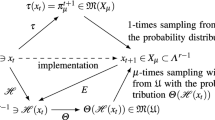Abstract
In this paper we investigate the properties of CEAs with populations structured as Watts–Strogatz small-world graphs and Albert–Barabási scale-free graphs as problem solvers, using several standard discrete optimization problems as a benchmark. The EA variants employed include self-adaptation of mutation rates. Results are compared with the corresponding classical panmictic EA showing that topology together with self-adaptation drastically influences the search.
Preview
Unable to display preview. Download preview PDF.
Similar content being viewed by others
References
Lehmann, E., D’Abrera, H.: Nonparametrics: Statistical Methods Based on Ranks. Prentice-Hall, Englewood Cliffs (1998)
Tomassini, M.: Spatially Structured Evolutionary Algorithms: Artificial Evolution in Space and Time. Springer, New York (2005)
Albert, R., Barabasi, A.-L.: Statistical mechanics of complex networks. Reviews of Modern Physics 74, 47–97 (2002)
Newman, M.E.J.: The structure and function of complex networks. SIAM Review 45, 167–256 (2003)
Giacobini, M., Tomassini, M., Tettamanzi, A.: Takeover time curves in random and small-world structured populations. In: Beyer, H.-G., et al. (eds.) Proceedings of the Genetic and Evolutionary Computation Conference GECCO 2005, pp. 1333–1340. ACM Press, New York (2005)
Preuß, M., Lasarczyk, C.W.G.: On the importance of information speed in structured populations. In: Yao, X., Burke, E.K., Lozano, J.A., Smith, J., Merelo-Guervós, J.J., Bullinaria, J.A., Rowe, J.E., Tiňo, P., Kabán, A., Schwefel, H.-P. (eds.) PPSN 2004. LNCS, vol. 3242, pp. 91–100. Springer, Heidelberg (2004)
Bäck, T.: Self-adaptation in genetic algorithms. In: Varela, F.J., Bourgine, P. (eds.) Toward a Practice of Autonomous Systems – Proc. First European Conf. Artificial Life (ECAL 1991), pp. 263–271. MIT Press, Cambridge (1992)
Beyer, H.-G., Schwefel, H.-P.: Evolution strategies: A comprehensive introduction. Natural Computing 1(1), 3–52 (2002)
Whitley, D., Rana, S., Dzubera, J., Mathias, K.E.: Evaluating evolutionary algorithms. Artif. Intelligence 85, 245–276 (1997)
Wolpert, D.H., Macready, W.G.: No free lunch theorems for optimization. IEEE Transactions on Evolutionary Computation 1(1), 67–82 (1997)
Goldberg, D.E., Deb, K., Horn, J.: Massively multimodality, deception and genetic algorithms. In: Männer, R., Manderick, B. (eds.) Parallel Prob. Solving from Nature II, pp. 37–46. North-Holland, Amsterdam (1992)
De Jong, K.A., Potter, M.A., Spears, W.M.: Using problem generators to explore the effects of epistasis. In: Bäck, T. (ed.) Proceedings of the Seventh ICGA, pp. 338–345. Morgan Kaufmann, San Francisco (1997)
MacWilliams, F.J., Sloane, N.J.A.: The Theory of Error-Correcting Codes. North-Holland, Amsterdam (1977)
Chen, H., Flann, N.S., Watson, D.W.: Parallel genetic simulated annealing: A massively parallel SIMD algorithm. IEEE Transactions on Parallel and Distributed Systems 9(2), 126–136 (1998)
Droste, S., Jansen, T., Wegener, I.: A natural and simple function which is hard for all evolutionary algorithms. In: IEEE International Conference on Industrial Electronics, Control, and Instrumentation (IECON 2000), pp. 2704–2709. IEEE Press, Piscataway, NJ (2000)
Watts, D.J., Strogatz, S.H.: Collective dynamics of ’small-world’ networks. Nature 393, 440–442 (1998)
Bartz-Beielstein, T.: New Experimentalism Applied to Evolutionary Computation. PhD thesis, University of Dortmund (April 2005)
Dorronsoro, B., Alba, E., Giacobini, M., Tomassini, M.: The influence of grid shape and asynchronicity on cellular evolutionary algorithms. In: 2004 Congress on Evolutionary Computation (CEC 2004), pp. 2152–2158. IEEE Press, Piscataway (2004)
Rudolph, G.: An evolutionary algorithm for integer programming. In: Davidor, Y., Männer, R., Schwefel, H.-P. (eds.) PPSN 1994. LNCS, vol. 866, pp. 139–148. Springer, Heidelberg (1994)
Author information
Authors and Affiliations
Editor information
Editors and Affiliations
Rights and permissions
Copyright information
© 2006 Springer-Verlag Berlin Heidelberg
About this paper
Cite this paper
Giacobini, M., Preuss, M., Tomassini, M. (2006). Effects of Scale-Free and Small-World Topologies on Binary Coded Self-adaptive CEA. In: Gottlieb, J., Raidl, G.R. (eds) Evolutionary Computation in Combinatorial Optimization. EvoCOP 2006. Lecture Notes in Computer Science, vol 3906. Springer, Berlin, Heidelberg. https://doi.org/10.1007/11730095_8
Download citation
DOI: https://doi.org/10.1007/11730095_8
Publisher Name: Springer, Berlin, Heidelberg
Print ISBN: 978-3-540-33178-0
Online ISBN: 978-3-540-33179-7
eBook Packages: Computer ScienceComputer Science (R0)




